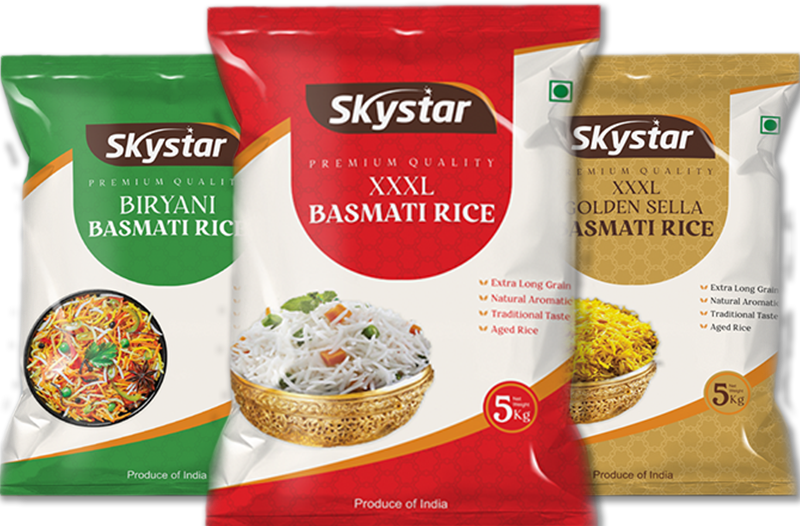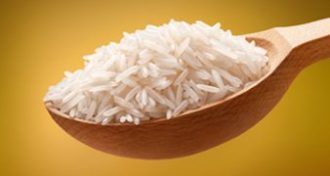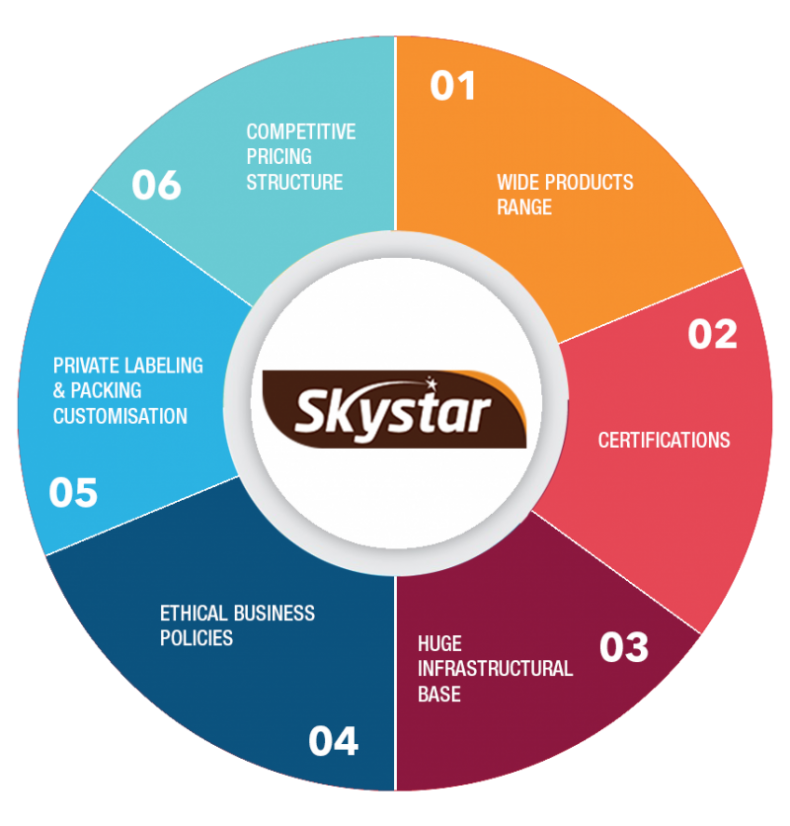







SKYSTAR EXPORTS PVT. LTD is a name synonymous with high quality products, 100% commitment and customer satisfaction. We at Skystar Exports have always believed in offering a best quality in its category to our Customers. We work on this thought that “QUALITY SPEAKS”. It is the quality which repeats again and again.
We are an ISO 22000:2018, HALAL, FSSC 22000:2018, HACCP, GMP, GVC, FSSAI & ISO 9001:2015 Certified and a well known name serving a considerable number of Indian and overseas clients creditably among premium Basmati Rice and Non Basmati Rice exporters.
Our infrastructure includes the state of the art fully automated and controlled mechanical processors to give precision prefect quality of each grain quality not only to satisfy customer needs but to delight them.
Read More

The name Basmati comes from the Hindi language, Bas + mati, meaning ‘Queen of Fragrance’. Indian Basmati has been grown in the foothills of the Himalayas and elsewhere around North India for thousands of years including Punjab ….

The cabinet committee on economic affairs on Wednesday approved in principle a Directorate General of Food proposal to import 1 lakh tonnes of rice from India under the direct purchase method.
The National Federation of Farmers’ Procurement, Processing and Retailing Cooperatives of India Ltd will supply the rice to the directorate at around Tk 368 crore.
The decision was taken in a virtual meeting chaired by finance minister AHM Mustafa Kamal.
The finance minister also chaired a meeting of the cabinet committee on government purchases and approved seven proposals, including the purchase of 50,000 tonnes of rice from PK Agri Link Private Ltd of India at Tk 174.65 crore by food directorate.
According to the update, moves have already been initiated to import 3 lakh tonnes of rice and 2 lakh tonnes of wheat to bolster the government food stock.

After record exports of around 12 million tonnes (mt) of non-basmati rice during 2020-21, exporters are confident of sustaining the trend this fiscal.
However, they see a slower start to the shipments in current fiscal as buyers have turned cautious over the sharp increase in freight rates.
“In the new financial year, we expect to sustain the shipment trend witnessed in last year as the supply issues are seen continuing in other major producing countries. However, with the rise in freight rates, we see buyers adopting a wait-and-watch stance. As a result, there will be a slower start to shipments,” said President, The Rice Exporters Association. However, the shipments for the earlier contracts will happen in April, he said.
Ocean freight rates have moved up by 50-60 per cent for both container and break bulk cargo, due to which the share of freight costs in the total product cost of rice has increased significantly, Rao said. The demand continues to be there for the Indian rice as the supply issues are seen continuing in the other origins. Though there’s an improved crop in Myanmar, exporters are seen facing challenges due to the prevailing political situation. Also a weaker Indian currency is seen aiding the country’s exporters.
Further said that the availability of rice for exports in the country was likely to be lower as the Government has stepped up the procurement. “We may not have last year’s level of supplies due to higher procurement, which may result in slightly firm prices. We are expecting the average realizations to increase by about $20 per tonne from the last year’s average of around $370,” he added.
India — with total exports of around 16 mt — has been the largest player in the world rice trade estimated at 50 million tonnes.
Basmati exports
Basmati rice exports are estimated to be between 4.5 and 4.6 mt, said Director, All India Rice Exporters Association. Basmati rice exports, which had registered a growth of around 16 per cent in volumes till December, slowed down in January-February period due to shortage of containers and also due to higher ocean freight rates. “As a result, we expect a overall growth in shipments to be marginal at around 1 per cent over 2019-20,” India exported 4.5 million tonnes in 2019-20. About 90 per cent of the basmati shipments are done through containers.

Hanoi imports 5% and 10% broken rice to meet its domestic demand
Vietnam, which resumed rice imports from India after decades purchasing lower priced 100 per cent broken variety, has now begun to buy better quality grades to meet its other domestic needs.
“Vietnam is buying five per cent broken white rice from us since its production is lower. This five per cent broken is used for supply to its defence forces and industrial users,” said Agri Commodities Exporters Association (ACEA) President.
Vietnam has bought the five per cent brokens at $410-420 a tonne (₹ 30,800-31,550) a tonne, “Vietnam is buying 10 per cent brokens too from us. It has been buying continuously from us like China. Its monthly imports of rice are around one lakh tonnes,” said The Rice Exporters Association (TREA) President.
The US Department of Agriculture (USDA), in its grain and feed annual report, said that Vietnam has bought 100 per cent broken rice from India at $310 ( ₹23,300) a tonne, at least $130 (₹9,775) lower than its own offers of broken rice.
100 per cent broken rice imports
Between December last year and January, Vietnam had imported about 65,000 tonnes of the 100 per cent broken rice from India, the USDA said quoting Hanoi Customs statistics. The rice was imported for preparing rice noodles, processing flour, brewing, and feed manufacturing.
While the USDA said that Vietnam would import five lakh tonnes (lt) during the current marketing year ending July, TREA said the South-East Asian nation could import about 10-12 lakh tonnes of rice at the rate of one lakh tonnes a month.
“Vietnam is focussing only on producing premium varieties only that fetch good prices in the global market,” said ACEA.
The USDA said that Vietnam high quality rice cultivation increased to 74 per cent last year, up 24 percentage points over the last five years.

Skystar offer a wide range of quality products that meet the needs of local as well as global customers operating in diverse and demanding markets to meet the changing needs of its customers
At Skystar we are at the forefront of quality and ensure that we have reached the highest standards in the industry. These certifications demonstrate our commitment to ensure highest quality and continuous improvement.
A state of the art rice processing facility which is well equipped with latest technology which assist us in maintaining the quality of the rice.
We have adopted ethical policy for the common standards to our company, management and employees. These standards are Integrity, Fairness, Trust, Compliance and Responsibility.
We are capable to meet all of private labeling needs and packing customization as per customer’s need and want.
To offer highest quality products to our customers at most competitive prices in the market and align it with customer’s expectations.